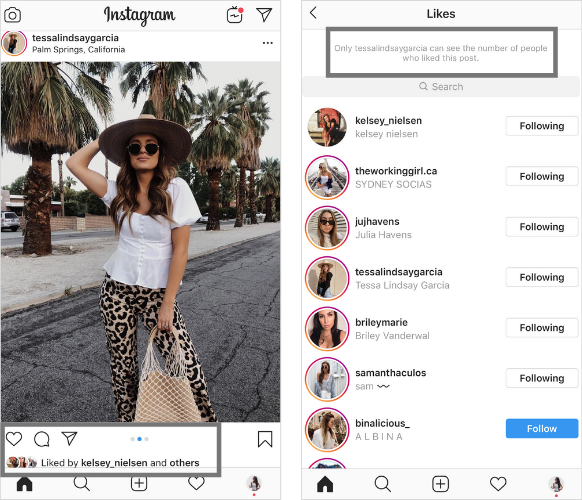Instagram taking the Social Pressure out of Social Media

Instagram’s new test shows that only the user who made the post will be able to access their like count. (Courtesy of later.com)
May 28, 2019
Recently, there have been rumors spreading that Instagram is going to test hiding the like counts on users’ pages. Adam Mosseri, the current Head of Instagram, has confirmed this rumor at Facebook’s annual F8 conference. During the test, which will first take place in Canada, only the user who made the post will be able to view the like count. According to Forbes, Mosseri stated that this feature was set up in order to create a “less pressurized environment where people feel comfortable expressing themselves.”
Some think that this potential change could combat the harmful effects that Instagram and other social media platforms have, like people basing their self worth off of how many likes they get, and, in effect, take the social pressure out of social media. There is a growing concern on the impact of like counts on mental health, with Twitter CEO and founder Jack Dorsey going so far as to say in a recent interview that the company would consider app designs that de-emphasize follower and like counts to fight this growing issue. While the hiding of like counts sounds like a major change for Instagram as it is a major part of the platform, this change may be overall beneficial for users.
There has been growing evidence to support the claim that overexposure to likes on Instagram may not be positive for the human brain. Ofir Turel, a professor at Cal State Fullerton and researcher at USC explained to Yahoo that “the brain responds to likes like any other reward or thing that excites the brain like food, sex or gambling. When you get likes, the reward system lights up and releases dopamine, making us feel good.” Turel, according to Yahoo, has been studying the impact of social media on the brain for over a decade. He says that users habitually check their phone because of social media platforms like Instagram that have created a “variable reward”.
This is most comparable to the effects of a casino. The mystery of whether your post will receive 10 likes or 100 likes is similar to the gamble of slot machines; sometimes you win money and sometimes you lose. As a result, this mystery keeps users glued to their phones, although, there can be major consequences attributed to this. Instagram may be the worst app to be “addicted” to as a study held by the U.K. Royal Society for Public Health in 2017 reported that “Instagram was the social app most detrimental to mental health for people 14-24, often exacerbating their depression, anxiety or body image issues.” The study found that the platform causes young women, in particular, to “compare themselves against unrealistic, largely curated, filtered and Photoshopped versions of reality”. Altogether, the possible transition of hiding the like count on Instagram may be a good initial step in the right direction to move away from a culture that is focused on comparing yourself to others and a desire for self validation in the form of likes because using a number to determine your worth as a person is obviously not a healthy mindset for a person.
With the change, even though users will be able to access their own like counts, they will not be made to be front and center anymore. To view their like tally, users will be forced to click through a number of added icons. The purpose of this test is aimed to “reduce the fixation on comparing likes between users and encourage users to post pictures without worrying that their posts can’t compare to the sleek production of a professional influencer” (Yahoo.com). But this brings up another issue: will the hiding of like counts hurt the businesses of these professional Instagram influencers, whose careers are based on the engagement with their posts?
While this potential change could have positive effects on people’s mental health, there are also concerns that this new update will hurt advertisers and Instagram influencers. Like count is an important tool that influencers use to determine follower engagement and negotiate deals with brands. Although, like counts are not the only metric that brands value when sponsoring influencers. There are several other metrics that brands use to determine the success of a brand’s campaign such as story engagement, follower growth, attention metrics, and click-through rates. Instagram has recognized the struggles that privatizing like counts may bring and are thinking of other ways influencers can “communicate their value to their partners” (refinery29.com). In the end, Instagram hopes that hiding the likes will actually drive deeper engagement on posts because people will be able to focus more on the posts in their feed rather than a number. Influencers will also be free of the pressures of some of their posts not performing as well and will be able to post what and when they want more freely.
Maybe Instagram privatizing like counts is a win-win situation for both mental health and brands. Alli Provenzano (12) adds that she “does not believe the hiding of like counts will affect her life too much but [she] know[s] others that will be quite distraught with the change.” While those addicted to checking and measuring their like counts will be disappointed, overall, an Instagram without likes really is not as dramatic as it sounds. There was life before like counts and life after will continue as well.




































